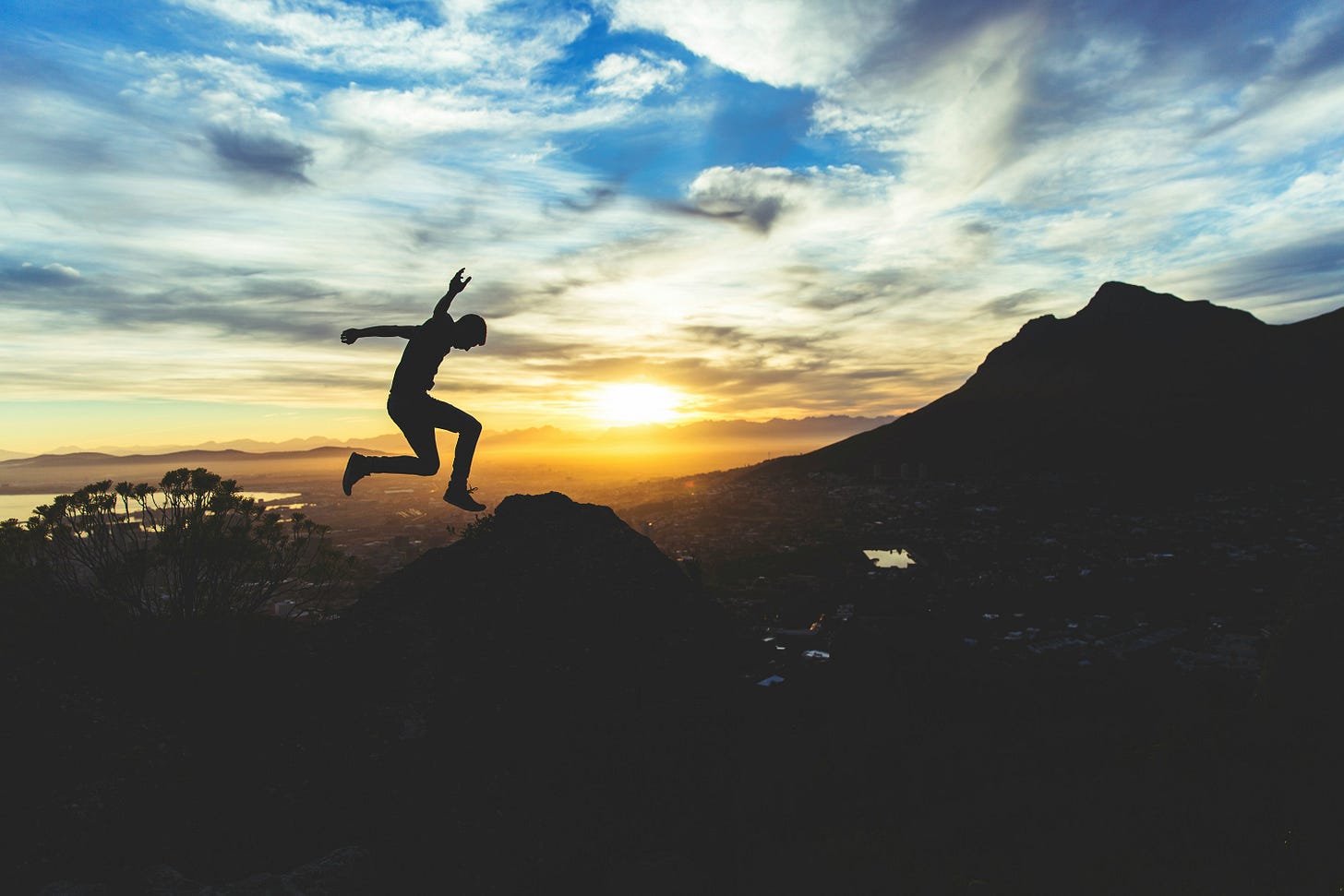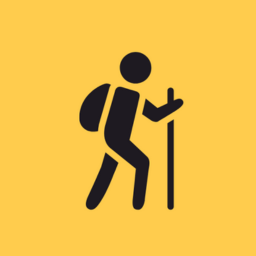
“Always do what you are afraid to do.”
- Ralph Waldo Emerson
Greetings fellow wanderers,
In August 2024, I introduced a new feature at Those Who Wander—a Those Who Wander Open Debate. In place of a usual weekly post, I’m posting a monthly debate question, focused on various travel and adventure topics.
The format is simple. I will post a question for debate and pose a prompt about it. Then, there will be a poll and an opportunity to leave a comment to expand on your answer. Please feel free to respond at any length you like.
I will also repost the stats from the previous month’s poll. Last month, I asked, ‘Can travel be a tonic for self-loathing and general miserableness? ‘ with 88% saying ‘Yes’, 6% saying ‘No’, and 6% answering ‘Unsure.’ Thank you to everyone who participated and shared your thoughts!
Now, onto today’s question and prompt:
Does travel and adventure make us less fearful?
As much as I believe humans have an inherent wanderlust and love to experience the novelty of being in new places, I also think we have an equal, perhaps even stronger love of staying put. Part of the repertoire of being human is that we are incredibly adaptable, which means we adjust to a wide spectrum of environments—ones where we can be entirely mobile, or entirely stationary. Indeed, our desire to wander and expand our horizons is central to why our species is now global. Yet, there are strong arguments for sedentism or “settling down” as well, not least of which is that hunkering down in one place provides a reassuring sense of comfort and security.
“Why should we go somewhere else, if we do not have to?” is a central question I tackle in my upcoming book An Anthropology of Wandering: How Adventure Can Alleviate a Fearful Culture. Traveling can be expensive, environmentally damaging, and full of genuine danger, risk, and uncertainty. There’s often no guarantee we’ll gain much of anything from venturing out into the world and could, in fact, return miserable and regretful. While I believe there are many challenges and ethical concerns with travel in the 21st century, I am still convinced that the benefits of travel and adventure outweigh the risks and costs, and that many of us ought to indulge in wandering in this world far more than we do. And that is because, as I argue in the book, confronting and overcoming fear and anxiety is one of the core lessons we learn from extensive travel and adventure:
Adventure and travel often put fear in its place. As it is typically the fear of others that preoccupies our minds, one of the most central things a person becomes aware of with consistent new contact with other people and places is a diminishing sense of fear and apprehension about the world in general. We become more familiar with human nature and thus gain a greater affinity for others. This allows us to see through the eyes of those who may, on the surface and from a distance, appear wildly different from us and our cultural ways. Eventually, we gain an insight into just how complex human beings are. In the end, our adventures have us look back in hindsight at our previous fears to see how ill-informed we once were—we are enabled to see more clearly the difference between perceived fears and actual risks.
The famed televangelist of travel, Rick Steves, put it sharply in a recent interview with the New York Times by saying,
My challenge is to try to inspire people to be thoughtful. The most frightened people are the people who have never traveled, whose worldview is shaped by commercial news media. And the people that are not afraid are the people who have been out there and met the enemy. My most powerful travel experiences have been going places where I’m not supposed to go: Cuba, Palestine, Iran. The friendliest people, the most curious people, the people that need to meet me and I need to meet them. When they meet me, it’s tougher for their propaganda to demonize me, and when I meet them, it’s harder for my country’s propaganda to dehumanize them. It’s a powerful thing.
However, I’ve noticed time and again an interesting phenomenon that the longer one stays put, the harder it is to break free of our prescribed routines. Worrisome news tends to create a wedge in our minds. The longer gaps between my forays out into the wider world have shown me that the longer I remain sedentary, filling my head with the alarmist news cycles, the more complacent I tend to become. And when I push myself to venture out again, I have an initial impulse to ruminate about all the things that could go wrong in the days leading up to my trip. I go into what I call “what if” mode, focusing exclusively on all that could befall me.
I’ve experienced enough travel and adventure and studied enough anthropology and psychology to know what’s happening in my mind that I can still muster the onslaught of bad news while remaining confident that I will likely return home from my travels, realizing once again, my fears never measured up to reality. This was one of the key epiphanies I had when I returned from the Appalachian Trail years ago and reflected on all the things I had previously worried so much about:
Since my time on the Appalachian Trail, it has been a goal of mine to pay close attention to all the dangerous or violent instances I might encounter whenever traveling somewhere new or just experiencing daily life. Rarely are such instances encountered. And if they are, they’re never at the level imagined. This is important for each of us to be more cognizant of because we are so bombarded with worrying information all the time that we rarely notice how little of it happens to us. Unreasoned or perceived fears have a great tendency to lead us astray. Travel and adventure tend to push back against all the prejudices we build up over time and as a result, we can gain more equanimity about the state of the world.
Although we may love traveling and being on the move, we also need to acknowledge that there are sound reasons that compel us to remain sedentary. I gain immense pleasure when I can enjoy the slow weekend evenings once our child has gone to bed, and I can sit back and dive into a new book or finally share in a full, uninterrupted conversation with my wife. There is much I’ve come to appreciate about “settled life.” So, it sometimes feels like I inhabit two worlds simultaneously, living on a pendulum, swinging back and forth between having the desire to appease my occasional restlessness to wander, and…not wander so much.
I return to the larger questions for our society and culture: How much does fear play a role in grounding us and inhibiting our wanderlust? What are the risks of not taking risks? And does travel and adventure make us less fearful?
I believe it does, in many ways. As I wrote in Dare to Venture Down Unknown Paths
The values and lessons of adventure elude many of us because adventure means danger and risk, and much of contemporary culture and society has become allergic to danger and risk. We’ve cultivated an unhealthy obsession with safety that feeds into our culture of fear. Nevertheless, we all possess an adventure left untaken, unexplored, unlived. What exactly is stopping us from participating in one of the most ancient and instrumental behaviors of our species, an intoxicating mix of serendipitous wondering and wandering?
We can never anticipate the future, and we spend incredible amounts of our time living in fear and worry about what’s to come. One answer to alleviate these fears and anxieties about the state of the world is to simply be more spontaneous with our lives. That includes taking on some daring adventures, especially when we are young. Where and how those adventures unfold specifically will be up to each one of us, but I encourage everyone to dare to venture down some unknown paths, nonetheless. Meaning is guaranteed to be found for those who wander.
I know where I currently stand on this topic, but I want to hear more from other travelers and adventurers. What are your thoughts on this?
Whether it involves other people and cultures, climbing mountains in the depths of nature, or simply not being overwhelmed by the never-ending frightful news media, does travel and adventure make us less fearful?
Expand on your answer in the comments:
Thanks for being a fellow traveler with me and participating in the discussion. I look forward to hearing your thoughts. Please consider subscribing, sharing, and supporting this project—much more to follow.
Cheers!
-JSB






I believe it does make us less fearful, Justin, b/c I believe it brings out the adeptness in us to handle different, sometimes difficult, situations--and survive. Once we have mastered one or two out of sorts happenings, it makes us more alert, more situationally aware, and hopefully, more ready for the next challenge that life (or travel) throws our way. It's a great, thoughtful question.
Yes, but...As I've aged and unwelcome changes have occurred in my body, I am more hesitant to go places where I might have difficulty managing a medical emergency. Even traveling with young children did not affect me like this. The pandemic certainly did not help with this concern. I think my solo traveling days are complete. I need at least a partner who could help me navigate any problems. Go travel while you are young(ish) and healthy.